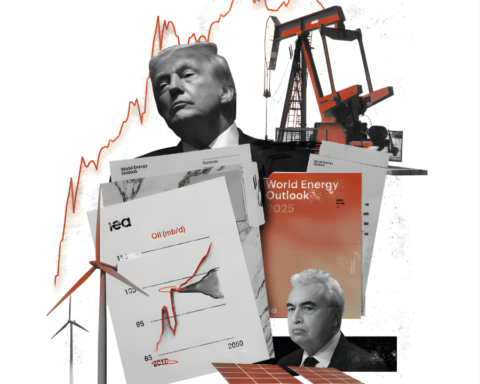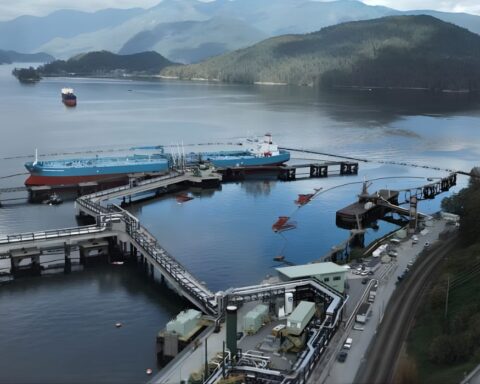The Ontario Teachers’ Pension Plan (OTPP) has a gas problem, and its net-zero plan doesn’t pass the smell test.
The problem goes beyond simply financing the construction of new gas projects and buying shares of gas producers. In many cases, the OTPP outright owns entire fossil gas companies and utilities.
The OTPP manages nearly $228 billion in pension savings on behalf of 331,000 working and retired Ontario teachers, with private equity and infrastructure comprising a growing proportion of its portfolio.
The pension fund made laudable progress in its approach to climate change in 2021, committing to being net-zero by 2050, setting ambitious mid-term emission-reduction targets and growing its investments in profitable climate solutions to $30 billion.
Yet the OTPP’s financial footprint in the fossil gas sector remains massive.
In its 2020 annual report, the OTPP reported that it held just under $3 billion of “oil and gas” in its inflation-sensitive portfolio. The OTPP is unique among Canada’s pension funds in that it dedicates an entire reporting category of its infrastructure portfolio to “gas transmission and distribution,” valued at nearly $2 billion as of December 31, 2020. In July 2021, the OTPP purchased a 15.8% stake in Puget Sound Energy (PSE), a Washington-based integrated utility with 1.2 million electric and 900,000 gas customers. PSE derived two-thirds of its electricity from fossil fuels in 2019. And in August, OTPP bought a 37.5% stake in SGN, the United Kingdom’s second-largest fossil gas distribution company.
Despite a growing number of teachers, and their students, asking the OTPP to stop investing their retirement savings in risky fossil fuels, the OTPP invested at least $200 million in three different private oil and gas producers and owns two oil and gas land-titles holding companies. The pension fund also owns shares of 30 different oil and gas producers, fossil gas utilities, or pipeline companies in its public equity portfolio, as of September 30, 2021. The business models of these companies are threatened by the required rapid transition away from all fossil fuels in coming years. In some cases, these companies are expanding fossil gas infrastructure and actively working to slow that transition.
The OTPP may be generating returns from its gas investments in the current energy landscape, but its financial stake in and entanglement with the fossil gas industry creates a complex contradiction.
Some OTPP-owned companies are also fighting policies to accelerate the transition to electrification and renewable energy, such as legislated bans on gas hook-ups in new buildings and incentives for electric heat pumps. PSE is trying to build a new gas export terminal in Washington. OTPP-owned Società Gasdotti Italia operates a 1,700-kilometre network of gas pipelines in Italy, which it is actively expanding. OTPP-owned Heritage Royalty, an oil and gas land-titles holding company that it bought from Cenovus Energy in 2015 for $3.3 billion, invites prospective producers to “find your next drilling location,” a clear invitation to expand oil and gas production. Enbridge, North America’s largest oil and gas pipeline company, on whose board the OTPP’s vice-chair of investments sits, is expanding its gas distribution infrastructure in Ontario and just opened its 760,000-barrel-per-day Line 3 crude oil pipeline.
Other senior OTPP staff and board members also have corporate connections to and financial interests in the oil and gas industry. One OTPP director sits on the board of ARC Resources, Canada’s third-largest fossil gas producer. Another board member previously served on the boards of Cenovus, one of Canada’s largest oil sands producers, and Enbridge Income Fund Holdings. And many senior OTPP investment managers serve on the boards of the private fossil fuel companies co-owned by the pension fund.
It is unclear how these fossil fuel entanglements could be impacting climate-related decisions within the fund. The OTPP is facing difficult decisions on how to reduce its exposure to growing climate risk. As the fund develops a credible Paris-aligned investment strategy, the fiduciary duty of OTPP board members and investment managers to secure the retirement savings of a young Ontario teacher might conflict with the business models and financial interests of the fossil fuel companies on whose boards they sit.
The OTPP may be generating returns from its gas investments in the current energy landscape, but its financial stake in and entanglement with the fossil gas industry creates a complex contradiction. Pension funds must maximize short-term returns while at the same time investing in the best long-term interests of beneficiaries, which requires mitigating climate-related financial risks and averting runaway climate change.
As Canada and countries around the world face the intensifying climate crisis and grapple with the existential need to limit global heating to 1.5℃, the production of fossil gas must rapidly decrease and the entire gas supply chain must be transformed. The International Energy Agency’s pathway for achieving net-zero by 2050 means there is “no need for investment in new fossil fuel supply,” and “beyond projects already committed as of 2021, there are no new oil and gas fields approved for development.”
Last year, the OTPP set a target for two-thirds of its portfolio carbon emissions to be covered by credible, science-based company net-zero plans and targets by 2025, and 90% by 2030. As well, some of the fossil gas companies owned by the OTPP portfolio have signaled a commitment to transition away from fossil fuels. But while OTPP has made significant progress on climate to date, through the actions of the fossil gas companies that it finances and owns, the OTPP is still using teachers’ retirement savings to actively work against their best long-term interests.
Even if gas companies and expansion projects make money in the short-term, all fossil fuel expansion investments contribute to the risk of triggering a climate-fuelled financial collapse in the future. For a young Ontario teacher hoping to retire in 2050 into a world with a stable climate, banking their retirement on companies that lobby against stringent climate policies, expand fossil gas infrastructure and lock in carbon pollution don’t make any sense – financially or ethically.
Patrick DeRochie is the senior manager for Shift Action for Pension Wealth and Planet Health, a charitable project that tracks the fossil-fuel and climate-related investments of Canadian pension funds and mobilizes beneficiaries to engage their fund managers on the climate crisis.







